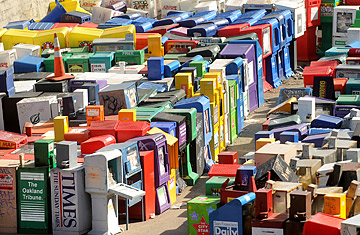
Disused newspaper racks clutter a storage yard.
What effect do newspaper closings really have on a town? Or a nation? Depending on a person's reading habits, the answers to these questions range from "It's the death of democracy!" to "Newspapers? What newspapers?" But with the demise of two major metropolitan dailies, the 149-year-old Rocky Mountain News and the almost equally venerable 145-year-old Seattle Post-Intelligencer in the last month alone, the issue is becoming a matter of practical rather than just theoretical concern. (See the 10 Most Endangered Newspapers in America.)
A glimpse into what might happen has been offered up by a new study out of Princeton University. Assistant Professor of economics and public affairs Sam Schulhofer-Wohl and Miguel Garrido looked at communities affected by the closing of the Cincinnati Post at the end of 2007, and it's not an attractive view.
The study is very small in scope, since the Post had a total of only 27,000 subscribers in Cincinnati and northern Kentucky. And it measures only the outcomes in northern Kentucky, since Ohio has not had municipal elections since the Post's closure. But even with those limitations, a few trends seemed to emerge: in towns the Post regularly covered, voter turnout dropped, fewer people ran for office and more incumbents were reelected. That is, when there were fewer stories about a given town, its inhabitants seemed to care less about how they're being governed. (Check out a report on the state of the media.)
In the only possible hint of a bright spot, it seemed that smaller towns were much less affected by newspaper closures than larger ones. Voter turnout in the smaller communities did not change.
While Schulhofer-Wohl is at pains to point out that the study is not definitive and took place during what was an atypical election year, he also said that he and Garrido controlled for the Obama effect. "To the extent that we can extrapolate, we can say that local coverage is something the newspapers uniquely provide," he says, "and when people don't have it, they're much less engaged."
While the study only looked at one newspaper, if the larger findings hold true, it’s not just areas in which a newspaper folds that will be affected. Municipalities covered by newspapers that have sharply scaled-back newsrooms, such as the Newark Star-Ledger, may also see similar trends emerging, because the papers simply cannot cover as much local news as they had previously.
A recent Pew study found that fewer than half of Americans say that losing their local paper would hurt their civic life "a lot" and even fewer say they would miss reading it, partly, it seems, because they get their local news from other media, mostly TV. But since papers are the primary source for most other news outlets, a major link will be missing from the news ecosystem. If a paper does not cover a story, it is unlikely to be covered in the broadcast media, whose reporting staffs tend to be even smaller.
"We're almost totally dependent on local newsgathering here," says Dave Ross, a radio host on Seattle's KIRO (AM), who recently moderated a discussion panel on the death of newspapers in his hometown. "We often try to take the story further but it starts with the local papers or their websites." He notes that while there are many bloggers in Seattle, that's not the same as reporters. "My concern is that there will be more opinion and less fact-based reporting."
Unlike some of the metropolitan dailies that have closed, including the Seattle P-I, the Cincinnati Post did not leave behind a news website. Neither did the Rocky Mountain News, although some of its former news staff are attempting to launch one. It did leave behind a competitor, the Cincinnati Enquirer, but the Enquirer does not report as much news from north Kentucky towns as the Post did.
